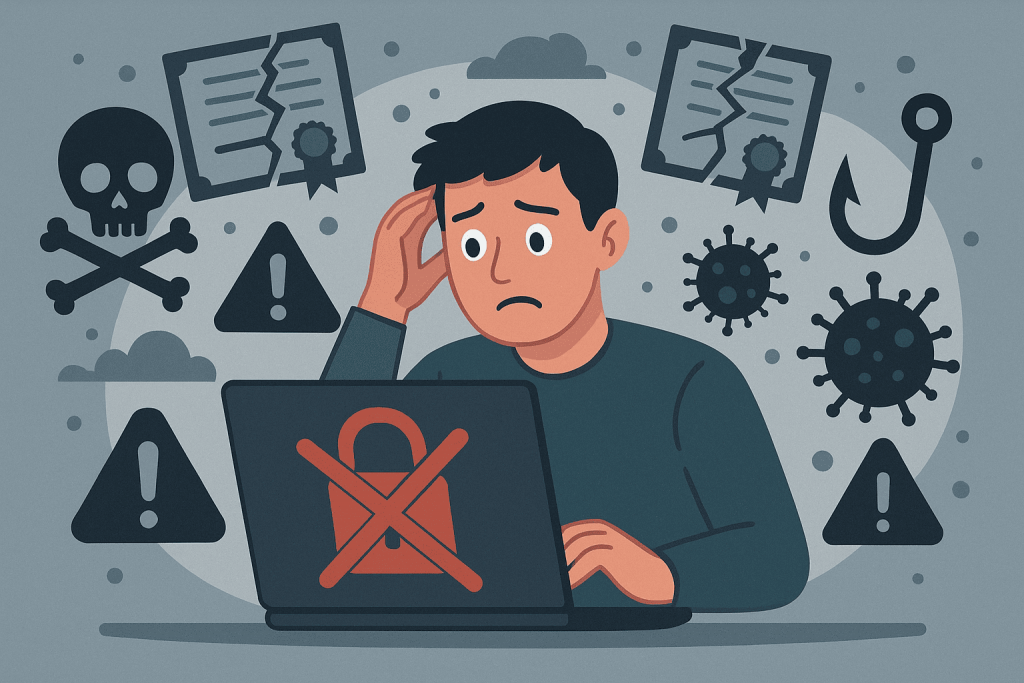
Imagine the internet without the little padlock in your browser’s address bar. No green “https://”, no guarantee that the data you enter — from your login to your credit card number — is safe from prying eyes. That’s what the world would look like without SSL certificates. And although today they seem invisible, these digital keys are what keep the modern web afloat.
SSL (Secure Sockets Layer) is an encryption technology that ensures secure data exchange between a user and a website. When you visit a page with HTTPS, your browser and the server “agree” on a unique key used to encrypt every byte of transmitted information. Without this mechanism, anyone positioned between you and the site could intercept your data — passwords, messages, files, or payment details. Today, dozens of organizations issue SSL certificates — from Let’s Encrypt to global certification authorities — all serving one purpose: to build trust between people and servers.
A World Without Encryption
If SSL certificates disappeared, the internet would roll back to the 1990s. Every request you send would once again be transmitted in plain text. Your email password, your online shopping cart, your private chats — all of it would be visible in unencrypted form. Imagine sending a postcard that every mail carrier can read along the way. That’s how data transmission without SSL would work.
Hackers would receive a real “golden ticket.” Network eavesdropping, account theft, and phishing attacks would become the norm. Viruses and malicious sites would spread with every click since browsers would no longer be able to verify secure connections. Users could no longer be sure they were visiting their bank’s real website instead of a fake one designed to steal personal data.
The End of Trust and the Collapse of E-Commerce
The internet without SSL is an internet without trust. Online banking would cease to exist. Online stores couldn’t accept payments — no payment system allows unencrypted transmission of financial data. Even social networks would be at risk: people simply wouldn’t dare to enter their passwords anymore.
Search engines that today reward secure sites with higher rankings would immediately react — the entire web would become “unsafe.” Every page would display red security warnings, and most users wouldn’t dare to proceed further. Businesses would lose customers, and users would lose confidence in their safety.
Legal Chaos and Digital Collapse
SSL certificates are not just a technology — they are part of the legal infrastructure of the internet. They confirm that a website truly belongs to a particular company or organization, creating a kind of digital identity. Without them, no online signature, electronic agreement, or API integration would hold legal validity. Platforms that exchange data — from banks to cloud services — would lose the ability to verify each other’s authenticity.
Imagine receiving an email that looks like it’s from the tax office but having no way to verify the sender. That’s what every digital interaction would look like in a world without SSL — from government portals to medical systems. Trust in digital processes would simply vanish.
The Internet That Stopped Being the Internet
Without SSL, the internet would resemble a massive local network where everyone is on their own. Companies would start creating their own incompatible security standards. Instead of one global space, we would have dozens of isolated “islands” — from corporate clouds to national networks — unable to communicate safely with each other. That contradicts the very essence of the internet as a unified system for sharing information.
Browser developers, DNS operators, and ISPs would scramble to find temporary solutions. New encryption standards might eventually appear, but implementing them would take years. In the meantime, the internet would lose much of what we take for granted today: online payments, authentication through Google or Apple, and even streaming video.
The Invisible Foundation of Our Safety
SSL certificates are far from a “technical detail.” They are the foundation of trust, security, and the entire logic of the modern internet. Without them, the web would no longer be a place where we can communicate, shop, study, or work without fear. It would revert to a chaotic network of open connections where every click is a risk and every site a potential threat.
So the next time you notice that little padlock in your browser, remember: it’s the reason the internet remains the safe, private, and reliable space we know today.

Leave a Reply